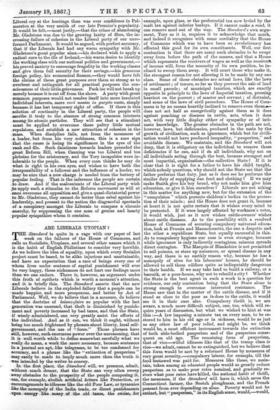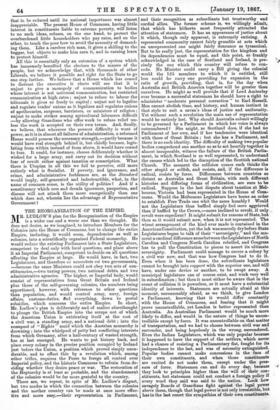ARE LIBERALS UTOPIAN?
THE Standard is quite in a rage with our paper of last week on the failures of the House of Commons, and calls us Socialists, Utopians, and several other names which it is the habit of English Philistines to consider very horrible. As we believe the idea of equality, upon which every Socialist project must be based, to be alike injurious and unattainable, and have no expectation that a race of beings every one of whom lives under sentence of capital punishment will ever be very happy, these nicknames do not hurt our feelings more than we can endure. There is, however, an argument under this froth of epithets which is worth a moment's attention, and it is briefly this. The Standard asserts that the new Liberals believe in the exploded fallacy that a people can be made happier, and more prosperous, and better by Act of Parliament. Well, we do believe that in a measure, do believe that the doctrine of laissez-faire so popular with the last generation was unsound, that theft is aiminished by punish- ment and poverty increased by bad taxes, and that the State, if wisely administered, can very greatly assist the efforts of the individual. And as it can, we think it ought, without being too much frightened by phrases about liberty, local self- government, and the use of "force." Those phrases have still, however, such enormous power over the unreasoning, that it is well worth while to define somewhat carefully what we really do mean, a work the more necessary, because sentences in a journal are apt, like telegrams, to be too condensed for accuracy, and a phrase like the "extinction of pauperism" may easily be made to imply much more than the truth it was intended by the writer to convey.
In the first place, the Standard will, we presume, admit, without much demur, that the State can very often sweep away obstacles to the prosperity of the people composing it, can, for example, abolish artificial fetters like Protection, or encouragements to idleness like the old Poor Law, or tyrannies like the monopoly of the India trade, or direct punishments upon energy like many of the old taxes, the excise, for , I example, upon glass, or the preferential tax now levied by the malt tax against inferior barleys. If it cannot make a road, it can remove mud out of the way. The Standard's own argu- ment, Tory as it is, requires it to acknowledge that much, and indeed it recognizes with some cordiality that the House of Commons which was to have been so revolutionary has effected this good for its own constituents. Well, our first contention is that there are many such obstacles to be swept away from before the path of the masses, and that a House which represents the receivers of wages as well as the receivetts of income will, from the necessity of its own position, be in- clined to sweep them away. It will court those who make it, the strongest reason. for not allowing it to be made by any one class. Some of these obstacles are actual laws, like the laws of settlement ; of tenure, so far as they prevent the sale of land in small parcels ; of municipal taxation, which are exactly opposite in principle to the laws of Imperial taxation, pressing heaviest on the poorest ; of master and servant ; of distraint, and some of the laws of civil procedure. The House of Com- mons is by no means heartily inclined to remove even these,.— does not act half as energetically against them as it does against poaching or diseases in cattle, acts, when it does act, with very little display either of sympathy or of inti- mate knowledge. The greater obstacles in the path are not, however, laws, but deficiencies, produced in the main by the growth of civilization, such as ignorance, which but for civili- zation would not have produced inequality, "pauperism," and avoidable disease. We maintain, and the Standard will not deny, that it is obligatory on the individual to remove these deficiencies if he can, and if dn all individuals, why not on all individuals acting through the best, because strongest and most impartial, organization—the collective State ? If it is clear that it is right for a father to have his child, taught, which nobody questions, why should not the State see .that the father performs that duty, just as it does see he performs the similar duty of supplying due food and clothing ? If we may make Smith give his boy bread, why not make him give him education, or give it him ourselves ? Liberals are not asking- hi this matter for anything new, but for the extension of the - "compulsion" which protects children's bodies to the protec- tion of their minds ; and the House does not grant it, because at heart it is not quite certain that it wishes every mind to be protected. If it were largely affected by workmen's votes, it would wish, just as it now wishes cattle-owners' wishes about cattle diseases. As to the possibility with a resolved House of Commons of securing compulsory universal educa- tion, look at Prussia and Massachusetts, the one a despotic and. the other a republican State, but equally successful in this. As to compulsory hygiene our case is even stronger, because while ignorance is only indirectly contagious, miasma spreads direct contagion. The Marquis of Blankshire is not permitted to sell poisons, or store up nuisances, or spread disease in any way, and there is no earthly reason why, because he has a monopoly of sites for his labourers' houses, he should be allowed to sell them edifices quite as indisputably dangerous to their health. If we may take land to build a railway, or a. barna, or a poor-house, why not to rebuild a city ? Whether the State is the best agent in such a work is a question for evidence, our only contention being that the State alone is - strong enough to overcome interested resistance. The House saw that in the matter of the cattle disease, and if it stood as close to the poor as am:1ms to the cattle, it would see it in their case also. Compulsory thrift is, we are aware, a much more difficult subject, one, too, which will re- quire years of discussion, but what we wished. to hint at was this :—A law imposing a minute tax on every man, to be re- stored to him in his old age or in sickness, would be as just as any other law of poor relief, and might be, we think would be, a most efficient instrument towards the extinction of both able-bodied pauperism and of the pauperism conse- quent on old age. The remaining form of pauperism, that of vice—wilful idleness like that of the tramp class is vice—we admit, cannot be so extinguished, but we believe that this form would be met by a reformed House by measures of very great severity,—compulsory labour, for example, till the food bestowed was paid for. Measures like these, we main- tain, taken among an educated people would so greatly reduce pauperism as to make poor rates nominal, and gradually re- store what poor rates have killed, the national habit of thrift, the meanness, if the Standard will have it, which saves the Connecticut farmer, the Scotch ploughman, and the French peasant from ever depending on alms. Poverty would not be extinct, but "pauperism," in its English sense, would,—would, that is, be reduced until its national importance was almost inappreciable. The present House of Commons, having little interest in constituents liable to extreme poverty, will listen to no such ideas, refuses, on the one hand, to protect the overburdened little householders who pay rates, and on the other, to teach the poor how to avoid the necessity of demand- ing them. Like a careless rich man, it gives a shilling to the beggar, but objects to make him earn it, and in earning learn to protect himself. All this is essentially only an extension of a system which has immensely benefited the electors to the masses of the people, but we acknowledge that, with thousands of other Liberals, we believe it possible and right for the State to go one step farther. We believe that a House which has ceased to distrust the executive it elects will see that it is unjust to give a monopoly of communication to bodies whose interest is not universal communication, but restricted communication at high rates ; unjust to refuse to labour the tribunals it gives so freely to capital ; unjust not to legalize and regulate trades' unions as it legalizes and regulates unions of apothecaries, surgeons, banisters, or ministers of religion ; unjust to make strikes among agricultural labourers difficult —by allowing Guardians who offer work to refuse relief un- less the work is accepted on their own terms. And, finally, we believe, that wherever the present difficulty is want of power, as it is in almost all failures of administration, a reformed House would possess the necessary strength,—partly because it would have real strength behind it, but chiefly because, legis- lating from within instead of from above, it would have ceased to fear. It could, for instance, choose deliberately whether it wished for a large army, and carry out its decision without fear of revolt either against taxation or conscription. What there is Utopian in all this we fail to perceive, still more entirely what is Socialist. If poverty, and ignorance, and crime, and administrative feebleness are, as the Standard would imply, self-generated and indestructible, what, in the name of common sense, is the utility of polities? And if a constituency which sees and dreads ignorance, pauperism, and disease will not attack them more energetically than one which does not, wherein lies the advantage of Representative Government?































 Previous page
Previous page